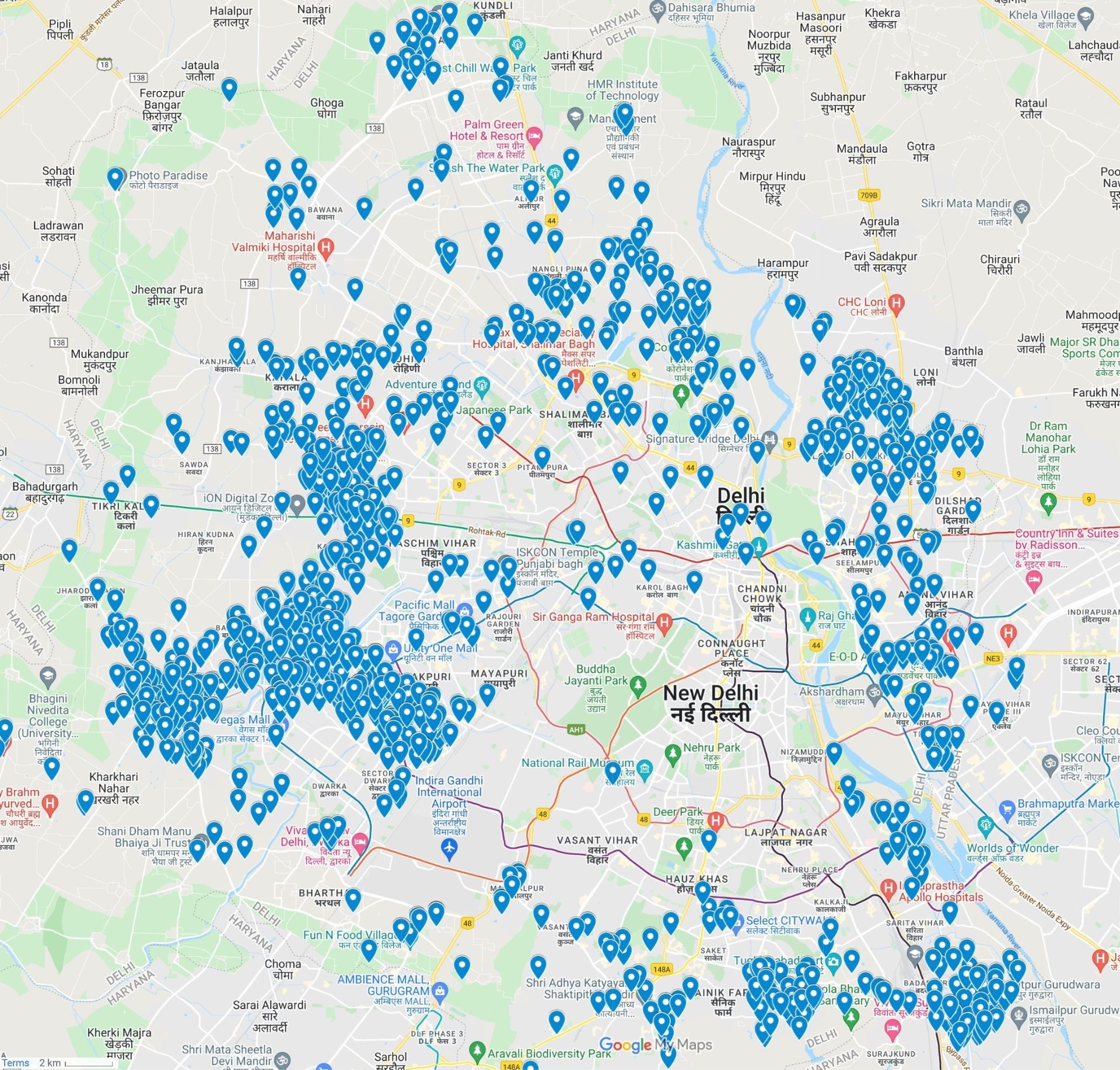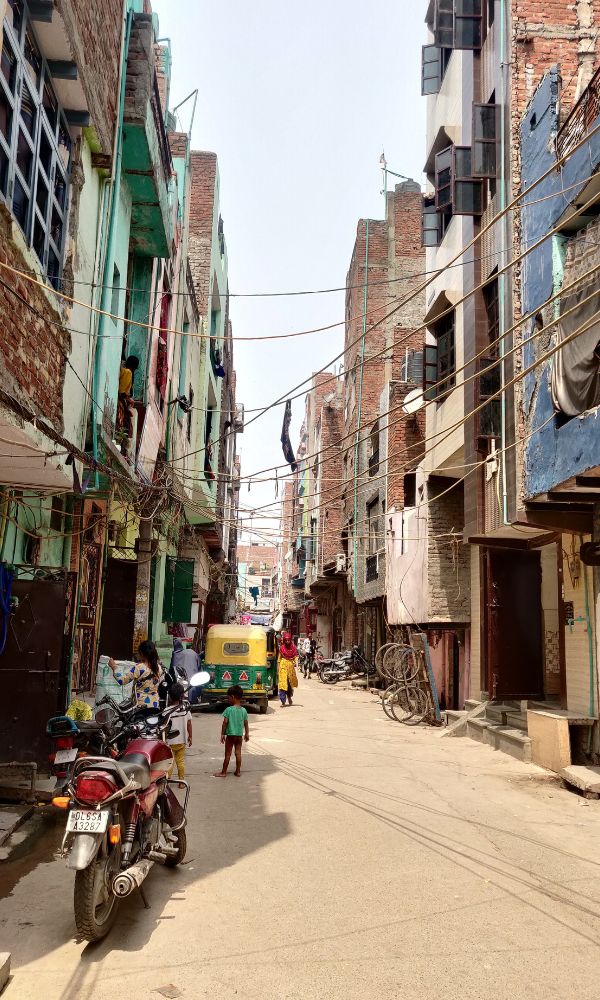
What is an Unauthorised Colony ?
A prevalent type of informal settlement usually on land not zoned for residential purposes, or in disregard to master plan regulations. There are approximately 12.5 lakh UAC households, housing over 40 lakh Delhi residents, that is over 30% of Delhi’s population. They remain in a state of precarity, maneuvering limited ownership rights, contested non-residential land use, and a lack of formal housing finance
In UACs, service deficiencies are prevalent. Lack of piped water connections, sewerage systems, and inadequate drainage are common across the 1700 odd colonies that exist in Delhi.
UACs have existed since the early 1960s. Over decades, multiple Regularisation schemes have attempted to grant legal status and recognise property titles as well as rights to sell, transfer, mortgage, seek housing finance, and pursue improved infrastructure services.
Policy Barriers
MASTER PLAN
- Limited applicability: The draft MPD 2041 prevents UACs that lie on the green belt, land pooling, and Zone O from applying for improvement schemes. This disqualifies about 75% of UACs marked on the map from the improvement schemes given under MPD 2041.
- Lacks inclusive and participatory approach: The draft MPD 2041 envisages the transformation of unplanned UACs into a planned form but does not mandate consent from residents. This makes residents vulnerable to private developers and processes of gentrification.
- Rigid development control norms (DCN): Most UACs are compactly built and are densely populated. Proposed DCNs are conventional and rigid, for eg, all the plots are required to be within a 30 m distance from a 9 m road, to adhere to fire safety norms. These norms are suitable for planned colonies and cannot cater to the informality of UACs.
Missing Link: Regularisation refers to both layout approvals under Master Plan and conferring ownership rights under PM-UDAY. As of now, there is no integration of these two policies.
PM-UDAY
- Limited Awareness: Residents are often ill-informed about the scheme and its steps and think that the initial GIS survey is all that is required. They also lack trust in the scheme, often arising from limited clarity on its benefits. Residents fear presenting and discussing their ownership documents with third parties.
- Requirement of third party facilitators: The PM-UDAY application process is online-only, and involves several steps and multiple agencies. This complicated, technical process leads to a degree of inaccessibility which additionally necessitates the presence of third-party facilitators. Residents remain uninformed about the process bringing about the possibility of certain deceitful agencies who overcharge and con in lieu of filing applications.
- Delisted colonies as per exclusions: The demarcation of environmentally-sensitive zones (Zone O), forest areas, etc. delists many of the colonies on the ground from participating in the scheme. Provisions such be made to include these and allow for regularisation.
- Existence of Mixed-Use buildings: Mixed-use buildings are prevalent in unauthorised colonies, with commercial units often occupying the ground floors. Currently, the scheme does not account for such typologies, eliminating a large set of residents from applying.
- Tackling deficiencies: On completing the application process, many residents have to tackle deficiencies raised by DDA, which often does not have a clear procedure laid out. In addition, DDA help desks and processing centres are often unclear about how to tackle these.
- Limited measures of proof leading to disqualification: A key requirement is to show proof of construction before
1st January 2015. Only limited forms of proof are accepted – electricity, water bills and property tax receipts.
Ways forward
MASTER PLAN
- Updated land-use categories: In the MPD 2041, the land use of all eligible UACs should be updated to residential/ mixed use. It is important for the plan to consider the mixed-use nature of these informal settlements rather than issue a single-use category.
- Flexible building bye-laws: In the MPD 2041, a higher number of residents are likely to opt for the ‘as is improvement scheme’ which is currently rigid. The scheme should allow for flexible building bye-laws by considering the existing built morphology of UACs. To encourage residents development incentives such as additional floor area ratio (FAR) and transfer of development rights (TDRs) should be extended.
- Participatory approach: Redevelopment and incentivisation will require negotiations with residents. The scheme should adopt a participatory approach and work closely with RWAs and CSOs. Where applicable, improvement schemes should require the consent of at least 50% of residents.
Integration of the master plan and PM-UDAY are key to regularisation of UACs. Currently, these two schemes are functioning in silos. Complete regularisation entails layout approvals via the Delhi Master plan, along with the transfer of ownership rights through PM-UDAY.
PM-UDAY
- Increased Awareness: To increase uptake, the DDA should increase awareness amongst residents about the scheme’s benefits, costs, and complete process. A clear roadmap may help households comprehend the process.
- Empowered and Functional Agencies: The PM-UDAY scheme requires an adequate number of help desks and processing centres to aid in the application procedure and the addressing of discrepancies. These need to be empowered to tackle ground level challenges via a flexible framework.
- Flexible Policy Frameworks and Partnerships: Helpdesks, along with processing centres, third-party agencies and CSOs need to be brought into the ambit to address ground-level challenges that exist in informal settlements. This can help find solutions to problems such as mixed-use, as well as sources of documentation that prove the duration of stay.
- Simplified application procedure: The online mode only, combined with the technicality of the application limits residents’ involvement in the scheme and increases dependency on third-party agencies, many of which fleece residents. The scheme should offer a mix of both online and offline support through agencies set up and vetted by the DDA, with fixed charges and timelines.
- Prioritise Women’s Ownership: GPAs in UACs are usually in the name of male members. The policy should facilitate and mandate women’s ownership, or at the minimum, joint ownership registration.
Disclaimer : The content of this webpage is based solely on research and on-ground implementation work during the ZAA (Zamini Adhikaari Abiyaan) project under the WOW (Work and Opportunities for Women) vertical, funded by the FCDO (Foreign, Commonwealth and Development Office) and implemented jointly with the Mahila Housing Trust (MHT). At present, the roadmap aims to visually depict the de-facto and de-jure strategies that aid in accessing tenure security for three types of informal settlements in Delhi – Unauthorised colonies, resettlement colonies, and slums. It is an attempt to collate the opportunities and barriers encountered by SEWA to access tenure security in the informal settlements of Delhi and is intended to be used by researchers, academicians, students, and civil society organisations (CSOs).


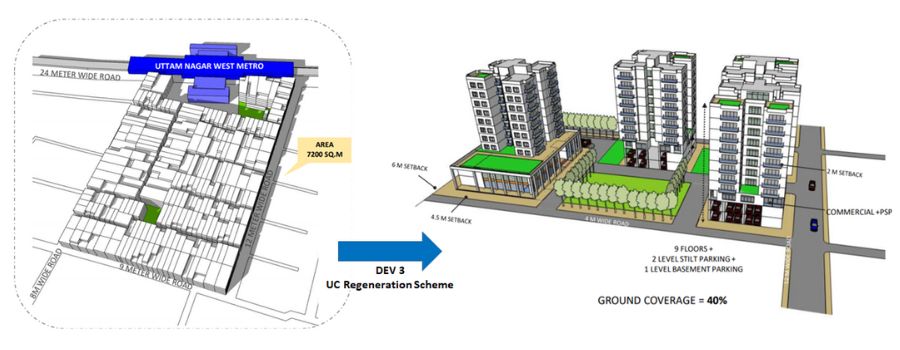
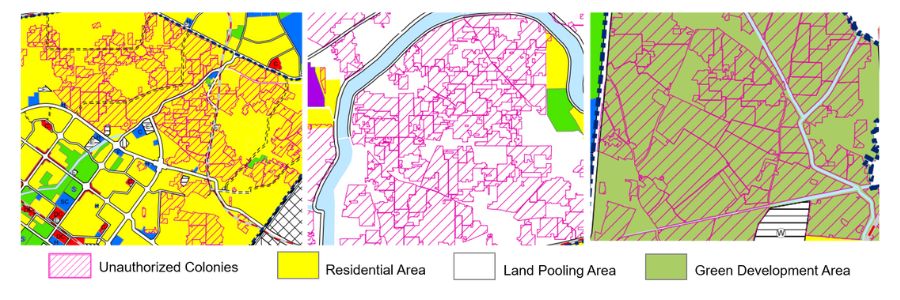
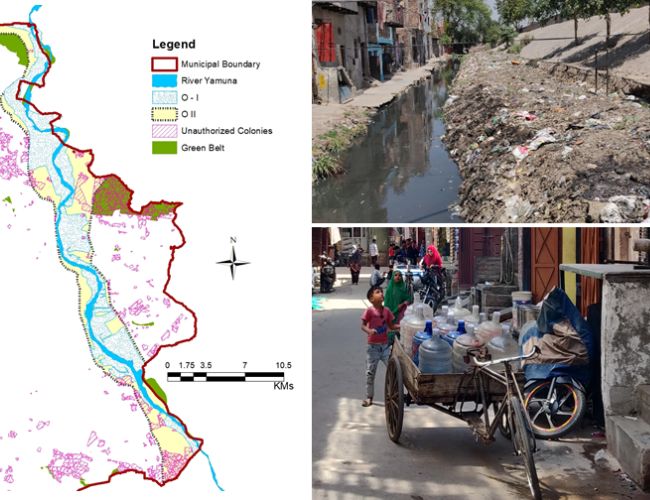 50% of the area under UACs is demarcated for
50% of the area under UACs is demarcated for